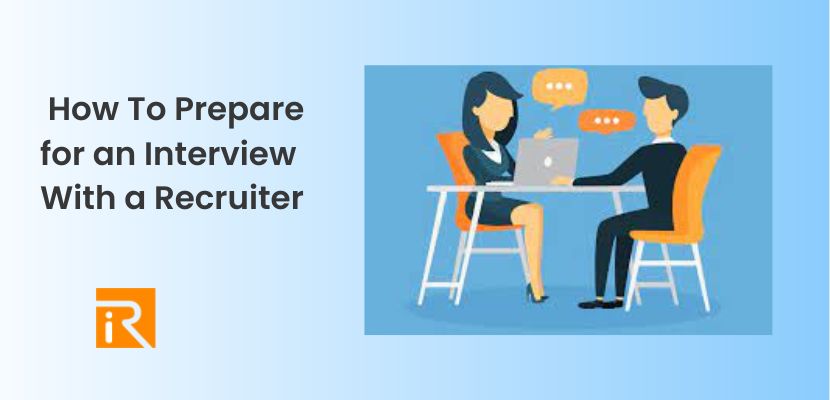Appearing for a job interview with a recruiter can be an intimidating and nerve-wracking experience. are After all, you’re being judged on your qualifications and fit for the position in just a few short minutes. As such, it is important to prepare ahead of time so that you have the best chance of making a great first impression and standing out from other candidates.
Interview statistics show some of the recurrent things which can happen in an interview and if you prepare yourself accordingly, your chances of securing a job increase to a great extent.
By doing research on the company, practicing answers to common questions, preparing questions of your own, understanding salary expectations before going into an interview, reassuring them of your qualifications if needed, discussing salary and benefits after you receive an offer, closing strong by thanking them for their time and expressing interest in the position as well as following up with thank-you emails after the interview are all key components to succeeding during this process.
Research the company and practice answers to common questions
When preparing for an interview with a recruiter, it’s essential to research the company thoroughly. Learning about the company’s mission, services, and values will help you gain insight into how your potential employer operates and what success looks like in their organization.
It is also important to practice answers to common questions that may be asked during the interview. Doing so can help you remain composed and confident during your meeting with the recruiter by allowing you to anticipate possible questions beforehand.
Practicing out loud can also prove beneficial as it allows you to become more comfortable talking about yourself and share details of previously held positions or achievements in a concise manner. Here are a few questions which you can ask when you are preparing.
– What experience do you have in this field?
– What makes you a good fit for this role?
– How would your previous colleagues describe you?
– What sets you apart from other candidates for this role?
– Tell me about a time when you had to go above and beyond in order to achieve success.
– Describe how working on a team has been beneficial in the past.
– How would your current boss rate your performance on the job?
Prepare your own questions about the role, company, and industry
When preparing for an interview with a recruiter, it is important to prepare questions of your own. This can demonstrate your level of interest in the role and company. Questions can be related to the role itself such as what challenges you might expect if hired or how the team operates.
Additionally, asking questions about the company’s culture, values and vision provides insight into its operations and management style. Finally, understanding key industry trends will help you understand how competitive the market is and where opportunities may lie within that sector. Examples of pertinent questions include:
– What day-to-day tasks are associated with this position?
– How does this team collaborate on projects?
– Are there any upcoming initiatives or goals I should know about?
– What would success in this role look like after six months?
– What trends have impacted/are impacting performance in this industry?
– Is there room for professional growth within this organization/role?
Understand salary expectations before going into an interview
It is important to understand salary expectations before going into an interview with a recruiter. Doing your research beforehand can help you determine if the salary and benefits being offered are commensurate with your skillset, experience, and qualifications.
Knowing the average salary range for similar jobs in your geographic area allows you to negotiate appropriately. Additionally, doing some research about the company’s history of salaries, bonuses, and other financial benefits will give you insight into the kind of financial package they typically offer.
In addition to researching salary expectations, it is also important to familiarize yourself with the typical types of benefits available from employers.
This includes health insurance coverage, vacation days or paid time off (PTO), retirement plans such as 401(k)s or IRAs, tuition reimbursement, and more. Understanding what type of non-wage compensation a company offers can be used as part of your negotiation strategy if needed.
It is also important to remember that interviewing for a job does not always mean accepting any offer that comes your way. Knowing what level of pay and benefits you are comfortable with makes it easier to make a decision when presented with multiple offers.
Taking the time to understand both industry standard salaries, as well as those which fit within your own budget, is key when preparing for an interview with a recruiter.
Be prepared to explain why you are qualified for the position
Before going to a job interview with a recruiter, it is important to be prepared to explain why you are the best person for the job. Think about your skills and experience that make you qualified for the position. Practice how you would explain these things out loud so that when it’s time for the interview, you can confidently talk about your qualifications.
Prepare a set of questions to ask
In addition to being prepared to answer questions, it is also important to have some questions ready for the interviewer. This shows that you are engaged and interested in the opportunity, as well as demonstrate your knowledge about the company. Researching the company’s culture, mission, and values can help you craft meaningful questions that demonstrate your understanding of the business.
Reassure them of your qualifications if needed
Once the interview is finished, you may also want to reassure the recruiter of your qualifications if needed. This could be done by providing additional details or references that demonstrate why you are the best candidate for the job.
Likewise, offering to provide any additional information or documents that validate your candidacy can help to strengthen your profile. Remember, as an applicant, it is important to show potential employers that you are organized, trustworthy, and reliable–all qualities that will help in securing the job.
Additionally, showing enthusiasm and expressing genuine interest in the role can go a long way in demonstrating why you are the right fit for the position. Be sure to reiterate what makes you unique and how your skills and experiences could add value to their organization.
This will leave a lasting impression on recruiters and potentially stand out among other applicants vying for the same position.
Discuss salary and benefits after you receive an offer
Once you receive an offer from a recruiter, it is important to discuss salary and benefits. Before the interview, research the market value for the job in question so that you have an understanding of what range to expect for compensation.
During the interview, explain your salary expectations as well as any additional benefits that may be important to you. Knowing what other companies are offering can help you negotiate more effectively and ensure that you receive fair compensation.
Be sure to consider taxes and deductions when evaluating an offer. Additionally, ask about other potential benefits such as vacation time, health insurance, 401k plans, telework options, or company discounts to get a better understanding of what is included in the overall package.
Making sure that both parties are on the same page prior to signing an offer will make for smoother onboarding in the future and set clear expectations from both sides. Discussing salary and benefits after receiving an offer allows you to ask questions and seek clarification before making a final decision on employment.
Close strong by thanking them for their time and expressing interest in the position
It is important to close strong by thanking the recruiter for their time and expressing your continued interest in the position. After you thank them, explain why you are excited about the opportunity and reiterate your enthusiasm for joining their team.
It is also a good idea to summarize any key points or qualifications you discussed during the interview that make you an ideal candidate for the job.
Additionally, ask if there is any additional information they need from you and ensure that they have all of your contact information so that they can follow up with you. Lastly, inquire about what steps come next in the hiring process so that you know what to expect going forward.
By expressing gratitude and interest throughout the entire interview process, it will show recruiters that you are invested in taking this step toward career growth and demonstrate your professionalism. Thanking them for their time and expressing continued interest leaves a positive impression on recruiters and can help increase your chances of receiving a job offer.
Follow up with thank-you emails after the interview
Following up with a thank-you email after an interview can be a great way to make a lasting impression on recruiters and show your enthusiasm for the position. A well-crafted thank-you email can help you stand out from other candidates by demonstrating your professionalism, attention to detail, and appreciation for your time.
When writing thank-you emails, be sure to include specific details that demonstrate your interest in the position and how you are a good fit for the role. Additionally, include any key points or qualifications that were discussed during the interview that set you apart from other applicants. Show gratitude for their time and reiterate why you believe you would be an ideal candidate for the job.
Thank-you emails should also follow up on any questions from the recruiter that weren’t answered during the interview or highlight any additional qualifications you may have that weren’t mentioned in the initial conversation. This is also a great opportunity to provide references if necessary or attach documents such as resumes or portfolios they might need.
Lastly, thanking recruiters after an interview shows respect and is a chance to express enthusiasm about continuing with to next steps in the hiring process. Sending thoughtful messages after each meeting, it will create positive interactions with recruiters and build strong relationships throughout the job search process.
Conclusion
By following the steps above, you will be well-prepared for an interview with a recruiter and have a better chance of landing the job. Take your time to research the company, practice answers to common questions, prepare questions of your own, understand salary expectations, and close strong – this is how you’ll make a great impression on the interviewer! Good luck in your job search!

















